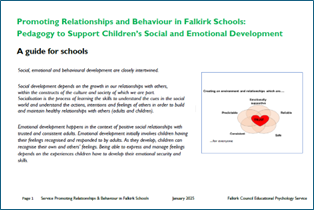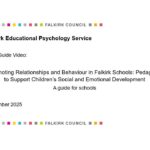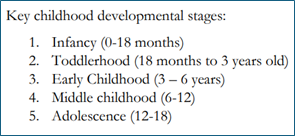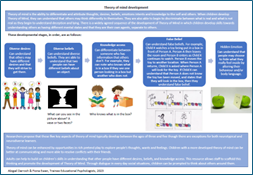Young Carers
Education Scotland (2024). Supporting Young Carers in Education.
Carers Trust (2021). Supporting Young Carers in Schools.
Education Scotland (2024). Supporting Young Carers in Education.
Carers Trust (2021). Supporting Young Carers in Schools.
Shared reading is a great way to develop children’s language and communication and to boost their reading skills. The Education Endowment Foundation have 7 top tips to support reading at home. This is also available in the following languages: Bengali, Lithuanian, Polish, Punjabi and Urdu. You can access the translations here.
Behaviour in children is a product of their social and emotional development. Social development depends on the growth in our relationships with others. Emotional development happens in the context of positive social relationships with trusted and consistent adults. The evidence in school and early years education is that positive behaviour is best promoted through:
Falkirk EPS has developed some key resources for school leaders and staff. The following guide is a key document to allow school practitioners to share, discuss and collaborate on the agreed approaches. This has been newly developed in 2025 as part of a three year strategic plan for Falkirk.

Promoting Relationships and Behaviour in Falkirk Schools (Jan 2025)

Promoting Relationships and Behaviour in Falkirk Schools Video Guide.
Additional resources that have been developed are provided below. Please also consider what training and development work would be helpful and have a look at CPD manager, our online training offers and our practitioners blog within the A-Z.
Understanding behaviour PDF handout
 Guide to development through toddlerhood, early childhood, middle childhood, adolescence covering the domains of: emotional awareness, recognition & regulation; social skills; relationships, self-identity and self-esteem. Click on image to access and accompanying document.
Guide to development through toddlerhood, early childhood, middle childhood, adolescence covering the domains of: emotional awareness, recognition & regulation; social skills; relationships, self-identity and self-esteem. Click on image to access and accompanying document.
 Theory of mind is the ability to differentiate and attribute thoughts, desires, beliefs, emotions intents and knowledge to the self and others. When children develop Theory of Mind, they can understand that others may think differently to themselves. They are also able to begin to discriminate between what is real and what is not real as they begin to understand deception and lying. There is a widely agreed sequence of the development of Theory of Mind in which children develop skills towards understanding others as having different mental states and that they are their own agents, separate to others. Click on image to access.
Theory of mind is the ability to differentiate and attribute thoughts, desires, beliefs, emotions intents and knowledge to the self and others. When children develop Theory of Mind, they can understand that others may think differently to themselves. They are also able to begin to discriminate between what is real and what is not real as they begin to understand deception and lying. There is a widely agreed sequence of the development of Theory of Mind in which children develop skills towards understanding others as having different mental states and that they are their own agents, separate to others. Click on image to access.
Education Scotland has produced a range of materials which are designed to provide research, guidance, support, professional learning, exemplification and advice to practitioners in education for improving relationships and behaviour within their context – Improving relationships and behaviour.
The Journey: Adventures in Resilience a resource from Education Scotland written for 13-16year olds to be used by practitioners or parents/carers.
Resilience Alphabet (primary) (secondary resource pending)
Falkirk Council and Forth Valley child protection policies, procedures & guidelines
The National Risk Framework to Support the Assessment of Children and Young People (Scottish Government, 2012) is a ‘toolkit’ for child protection to support practitioners in identifying and acting on child protection risks in children and young people.
Forth Valley Managing and Preventing Harmful Sexual Behaviour guidelines and resources
Falkirk Council Care and Risk Management (CARM) procedure recognises the link between young people’s offending/risk taking behaviour and unmet need. It applies to young people between 12-18 years within Falkirk Council who present a serious risk of harm to others as a result of sexual and/or violent behaviour.
The Framework for Risk Assessment, Management and Evaluation (FRAME) (2014) is for local authorities and partners working with children and young people who offend (managing high risk and transitions).
Falkirk Council risk assessment pro-formas
Scottish Government (2020). Harmful sexual behaviour by children and young people: Expert Group Report.
Multiple online, self-directed modules for parents for children/young people of all ages and specific modules for children/young people with additional support needs. Free access using the code TARTAN
This flipbook provides information regarding the Parents Plus ASN programme. Please download a copy of the PDF to access the embedded website links.
Early Level ASN Parent Plus information poster.
Early Level Parent Plus information poster.
Paired approaches to learning involve setting up pairs of peers. usually an older child and a younger child.
There is very positive evidence that this works effectively. Follow the university of Dundee links to see the effect sizes.
Peer Tutoring – resources for teachers on Paired Reading and Thinking Skills from the University of Dundee.
Skills Development Scotland website
Autism Toolbox transitions section
Promoting positive post-school transitions for deaf young people in Scotland
My World of Work including School Leavers Toolkit
ThisMayHelp is a collection of very short videos and clear advice for parents/carers who have are looking for help for a wide range of concerns about young people, including understanding teenagers, teenagers safety, school avoidance, gaming and online activity, building resilience, self-care tips and much more.
Supporting children born preterm in school – link to a project partnership by University of Leicester, University of Nottingham, Loughborough University, University College London, and Ulster University. The website contains five online modules for education staff and can be completed in approximately one hour. The modules are:
Guidance for assessment and intervention for identifying and supporting specific learning differences in numeracy (dyscalculia) is available from East Dunbartonshire Council. It is based on the specific learning differences (literacy) pathway designed by Falkirk Council available above. East Dunbartonshire Dyscalculia Guidance (2018)
CALL Scotland (Communication, Access, Literacy & Learning) based at the University of Edinburgh have a range of materials to help children and young people across Scotland to overcome disability and barriers to learning including iPad Apps for children/young people with numeracy difficulties (including dyscalculia).
Applying Nurture as a Whole School Approach
Nurture and transitions

Trauma-informed practice toolkit (Scottish Government, March 2021)
National trauma training programme for the Scottish workforce
Improvement Service. Adopting a trauma-informed approach.
Trauma Sensitive Schools Checklist
Emotionally regulate before we educate (British Psychological Society)
Education Scotland have developed a range of curricular materials targeted at upper primary to support pupils learning: The Compassionate and Connected Classroom: A health and wellbeing curricular resource for upper primary
Psychological Services are piloting an Education Scotland training resource to support practitioners in this area and more details are available here: CCC-training-launch-leaflet
A Whole School Approach Framework for Schools to Support Children and Young People’s Mental Health and Wellbeing (published by Scottish Government August 2021).
Falkirk Educational Psychology Service Anxiety Toolkit Resources
This resource pack contains symbolised books and activities to support children’s understanding of wellbeing and self-care – Wellbeing Pack: symbol-supported books and activities to support children’s wellbeing.
Penumbra have created an online portal about self-harm for professionals and the public. The portal was created to provide recovery-focussed support, tools, and information that anyone can access to enable people to support themselves and others. This includes sections for those who self-harm, people supporting someone who self-harms, and professionals working with someone who self-harms.
Information on the Child and Adolescent Mental Health Service in Forth Valley.
Stress and mindfulness – a post for Christmas on stress
An e-learning module called ‘We All Have Mental Health: an introduction for teachers’ is available from the Scottish Association for Mental Health website
Children in Scotland wellbeing resource for teachers and practitioners to support children and young people’s understanding of their wellbeing. The resource is divided into sections for different age groups.
Hattie and His High-Impact Teaching Strategies: A Summary (2019) based on the John Hattie meta-studies captured in “Visible Learning”. Collective Teacher Efficacy is #1.
Specific Learning Differences and Literacy Pathway Falkirk Council April 2018
Further information on the literacy pathway and materials is available on the Specific Learning Differences | Falkirk Council Additional Support Needs blog.
The Addressing Dyslexia Toolkit is a free resource managed by dyslexia Scotland and funded by Scottish Government. Free online modules are available as part of the resource which support GTC Scotland Professional Standards, Professional Update and Professional Recognition .
Paired Reading and Thinking resources.
CALL Scotland (Communication, Access, Literacy & Learning) based at the University of Edinburgh have a range of materials to help children and young people across Scotland to overcome disability and barriers to learning including assisting with reading difficulties, Android Apps for reading and writing difficulties (including dyslexia), iPad Apps for reading and writing difficulties (including dyslexia).
Education Scotland 2025. Inclusion, wellbeing and equalities framework. (Essential, Informed and Skilled levels).
Scottish Government (2019). Presumption to provide education in a mainstream setting: guidance.
Education Scotland National Improvement Hub (2022). Rights, Reviews, Promises and Inclusion for All evaluation tool
The General Teaching Council for Scotland (gtc Scotland) (2022). National Framework for Inclusion (3rd edition).
Children in Scotland Inclusion Ambassadors
Falkirk Council Interpretation and Translation Support (updated 2022)
 Getting It Right for Every Child (GIRFEC)
Getting It Right for Every Child (GIRFEC)GIRFEC Forth Valley Practitioner Pages
GIRFEC – an overview (June 2022). This is a 30 minute introduction to GIRFEC provided by Louise McClatchey, Educational Psychologist. This consists of 1) audio PowerPoint, 2) a draft copy of Falkirk’s Child and Young Person’s Integrated Assessment and Plan and 3) useful links. This can be viewed by anyone working as part of a team around the child/young person or as a whole team CPD activity.
Mindset – 8 tips to promote a growth mindset
A range of resources can be found on the Education Scotland digital and digital skills site. The aim of this site is to provide support to educators to enhance their digital skills (to use technology) and ideas to apply those skills as part of their learning, teaching and assessment. There is also guidance, resources and ideas for planning learning in digital literacy, computing science and cyber resilience within Curriculum for Excellence.
Specific Learning Differences and Literacy Pathway Falkirk Council April 2018
Further information on the literacy pathway and materials is available on the Specific Learning Differences blog.
Call Scotland (2023). A Technology Checklist to creating a dyslexia-friendly classroom (poster).
Scottish Government/Education Scotland (2022) working definition of dyscalculia has been collaboratively developed to provide education staff, partners, families and learners with a nationally agreed description of the range of indicators and associated difficulties of dyscalculia.
Dyscalculia | Learning resources | National Improvement Hub (education.gov.scot)
Behaviour in children is a product of their social and emotional development. Social development depends on the growth in our relationships with others. Emotional development happens in the context of positive social relationships with trusted and consistent adults. The evidence in school and early years education is that positive behaviour is best promoted through:
Falkirk EPS has developed some key resources for school leaders and staff. The following guide is a key document to allow school practitioners to share, discuss and collaborate on the agreed approaches. This has been newly developed in 2025 as part of a three year strategic plan for Falkirk.

Promoting Relationships and Behaviour in Falkirk Schools (Jan 2025)
Additional resources that have been developed are provided below. Please also consider what training and development work would be helpful and have a look at CPD manager, our online training offers and our practitioners blog within the A-Z.
Understanding behaviour PDF handout
 Guide to development through toddlerhood, early childhood, middle childhood, adolescence covering the domains of: emotional awareness, recognition & regulation; social skills; relationships, self-identity and self-esteem. Click on image to access and accompanying document.
Guide to development through toddlerhood, early childhood, middle childhood, adolescence covering the domains of: emotional awareness, recognition & regulation; social skills; relationships, self-identity and self-esteem. Click on image to access and accompanying document.
 Theory of mind is the ability to differentiate and attribute thoughts, desires, beliefs, emotions intents and knowledge to the self and others. When children develop Theory of Mind, they can understand that others may think differently to themselves. They are also able to begin to discriminate between what is real and what is not real as they begin to understand deception and lying. There is a widely agreed sequence of the development of Theory of Mind in which children develop skills towards understanding others as having different mental states and that they are their own agents, separate to others. Click on image to access.
Theory of mind is the ability to differentiate and attribute thoughts, desires, beliefs, emotions intents and knowledge to the self and others. When children develop Theory of Mind, they can understand that others may think differently to themselves. They are also able to begin to discriminate between what is real and what is not real as they begin to understand deception and lying. There is a widely agreed sequence of the development of Theory of Mind in which children develop skills towards understanding others as having different mental states and that they are their own agents, separate to others. Click on image to access.
Education Scotland has produced a range of materials which are designed to provide research, guidance, support, professional learning, exemplification and advice to practitioners in education for improving relationships and behaviour within their context – Improving relationships and behaviour.